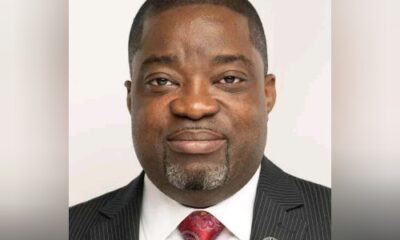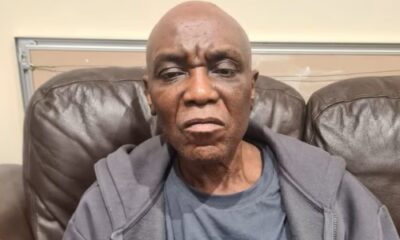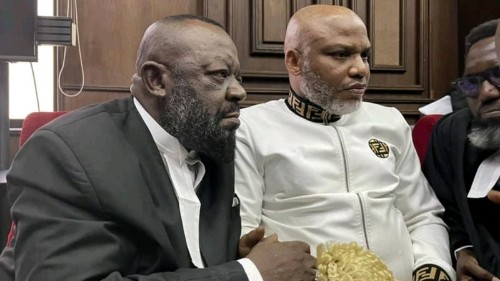In a bid to cub the rampaging kidnappers and bandits operating freely across the country, 15 state governors have assembled no fewer than 52,106-man vigilante squads to battle the hoodlums.
Officials in Delta, Kano, Plateau, Sokoto, and 11 other states have confirmed that their governors had put together a coalition of vigilantes, hunters, and neighbourhood watch groups to complement the police and other security forces.
Scores of Nigerians have been abducted across the country in the past weeks, with the Federal Capital Territory, Abuja, Lagos, and some other states coming under the abductors’ siege.
Though the authorities deployed troops and police operatives, this did not alleviate the security challenge.
Gunmen, on Monday, killed two Ekiti monarchs, the Onimojo of Imojo, Oba Olatunde Olusola, and the Elesun of Esun Ekiti, Oba Babatunde Ogunsakin, while the Alara of Ara Ekiti, Oba Adebayo Fatoba, narrowly escaped.
On the same day, suspected bandits also abducted five pupils of the Apostolic Faith Group of Schools and four staff members.
The abductors are demanding a N100m ransom for the release of the nine victims.
In response to the troubling situation, the Delta State Government said it had established 2,400 vigilante groups in the 11 local government areas of the state.
The state’s Director-General on Security Matters, Mr David Tonwe, stated this in an interview in Asaba on Wednesday.
He said, “Yes, we have about 2,400 vigilante groups in 11 local government areas of the state, including hunters. And they are working well. We are still making efforts to cover the whole 25 local governments.’’
- Kano Trains 2,500 Security Personnel
To assure Kano residents distressed by the abduction epidemic, the Kano State Government recently launched a training programme for 2,500 security personnel at the Sani Abacha Stadium.
The training was conducted last month at the state’s Corporate Security Training Institute in Gabasawa town, the headquarters of Gabasawa Local Government Area.
The initiative aims to boost youth job opportunities and strengthen the state’s security architecture.
The Director-General of Media and Publicity to the governor, Sanusi Tofa, said the trained personnel would be deployed in ministries, departments, and agencies to bolster the existing security structures and enhance public safety.
In Plateau State, Governor Caleb Mutfwang has boosted the strength of ‘Operation Rainbow,’ the local security outfit, to over 700 persons to beef up the security in the state.
The home-grown security outfit was established in 2010 by former governor Jonah Jang after approval by former President Goodluck Jonathan.
The creation of the outfit followed complaints by citizens about the poor performance of the conventional security operatives, who they accused of failing to protect them from the attacks by gunmen.
Former Governor Simon Lalong, who took over from Jang, was accused of relegating the security outfit to the background throughout his eight-year tenure.
However, Mutfwang, who succeeded Lalong, had said he was determined to revive the security outfit following the rising attacks and killings in several communities.
Recently, the governor unveiled 600 personnel of the outfit who passed out after vigorous training.
Before the latest addition, the outfit had over 100 personnel, who remained in the outfit during the Lalong years.
Mutfwang stated during the unveiling of the new personnel that the revitalisation of the outfit was timely, coming when the state needed consolidation on the gains of tackling the security challenges that had ravaged the state for years.
As part of strategies to tackle insecurity, the Sokoto State government has recruited no fewer than 2,000 persons into the newly established community guard corps.
Mallam Yushau Kebbe, the acting chairman of the corps, made this known in an interview.
He said the 2,000 corps members, who are training at the National Youth Service Corps permanent orientation camp in Wamakko, would be deployed across all 23 local government areas of the state.
“They will all be deployed to all the local governments across the state. Most of them were recruited from the vigilante groups in the state
“They are currently undergoing different kinds of training from security agents and will soon be deployed to work together with the security agents,” Kebbe revealed.
Like its counterparts, the Anambra State Government said it had established the Anambra Vigilante Services to complement the efforts of the federal security operatives.
Investigation showed that the vigilante service was set up during the administration of former governor Chris Ngige to tackle kidnappings in the state.
It was further gathered that the current administration of Prof. Chukwuma Soludo had strengthened the vigilante group to confront headlong the issues of kidnapping, which was hitherto rampant in about eight local government areas of the state.
The State Commissioner for Information, Paul Nwosu, and the Public Relations Officer of the state vigilante services did not respond to inquiries.
But a top official of the vigilante group, who gave his name as Jude Okeke, said, “Yes, the Anambra State Government has a security outfit called Anambra Vigilante Services backed, equipped, and financed by the state government to complement the federal security agencies in all the 21 local government areas of the state.
“The AVG operatives are no fewer than 7,000. Some vigilantes are also sponsored by communities in the council areas who work in collaboration with the police to combat crimes such as kidnapping in their areas.’’
Findings indicate that Bayelsa also has a 607-man vigilante group financed by the state government.
The state had also directed the leadership and stakeholders of communities yet to set up vigilante groups to complement the efforts of conventional security agencies to do so without any further delay to ensure the proper security of their domains.
The Deputy Governor, Senator Lawrence Ewhrudjakpo, handed down the directive in 2023 while hosting some stakeholders of the Ovom Community in the Government House, Yenagoa.
In Ogun State, over 16,500 members of the Vigilante Service of Nigeria and So Safe Corps are working with the security forces to protect the citizens.
The state Commander of the Vigilante Service of Nigeria, Sola Shodiyan, said that the officers of the group were over 10,000 while the Commander of Ogun State Community, Social Orientation and Safety Corps, codenamed So-Safe Corps, Soji Ganzallo, said the operatives of the security agency are 6,500.
Osun Amotekun Corps Commander, Brig. Gen. Bashir Adewinbi (retd.), told The PUNCH that the organisation had 354 personnel, adding that Governor Ademola Adeleke had approved the recruitment of an additional 650 men.
According to him, Adeleke was also planning to provide more equipment for Amotekun in the state to enhance its efficiency.
He added that local government areas at the state’s borders with other states were being closely monitored to prevent infiltration by bandits.
He said, “We have just 354 personnel. We are trying to look into one of our major challenges, which is strength, and the governor has graciously approved the recruitment of at least 650. He is equally ready to buy more equipment for us to complement the police for the security of the state.’’
“We have told our men to be very vigilant and intensify their intelligence gathering, particularly at all the border local government areas,” Adewinbi said.
The strength of the Benue State security outfits could not be confirmed as state officials declined to speak, but it was estimated to be about 3,000 personnel.
The four officially recognised outfits include the Benue State Community Volunteer Guards, Nigeria Hunters, and Forest Security Services, the State Livestock Guards, and the Nigeria Vigilante Group.
Recently, the groups embarked on a ‘show of force’ in Makurdi metropolis and Naka in Gwer West Local Government Area of the state to send warning signals to criminals.
The security adviser to the governor, Joseph Har, declined to give the number of the state security personnel but the past administration of Samuel Ortom recruited 1,500 into the then newly established Community Volunteer Guards.
When contacted, the security adviser said, ‘I cannot tell you the strength, if that is what they tell you, I don’t know.’’
In Gombe, the inauguration of a special security task force, ‘Operation Hattara,’ has reportedly boosted security in the state with the recruitment of 2,000 youths.
At the unveiling ceremony in August 2022, Governor Muhammadu Yahaya said the Gombe State Security, Traffic and Environmental Corps launch was part of efforts to reinforce the state’s security architecture.
To battle criminality, no fewer than 3,000 men and women of the Ebonyi State Neighbourhood Watch Security Outfit had been posted to the different parts of the state.
Towards curbing the growing insecurity bordering on kidnapping, armed robbery, and other violent crimes in Akwa Ibom State, Governor Umo Eno engaged 500 youths in the Ibom Community Watch Constables.
Speaking during the inauguration of the outfit last December, Eno explained that it was to enhance the security of the state.
Meanwhile, the Edo State Governor, Godwin Obaseki, has ordered the re-accreditation of all operatives of the state’s Security Vigilante Network, numbering over 6,500.
Obaseki gave the order during a security briefing at the Solomon Arase Command and Control Centre in Benin City, the Edo State capital, in the company of the state security chiefs.
He pledged to sustain his collaboration with security agencies to combat crime and criminality in the state.
On reaccreditation of the vigilante, the governor said, “We heard some kidnappers took over a checkpoint and attacked some policemen on patrol, but none lost their lives in the incident, and this has prompted the government to commence a total revamp of the vigilante structure.
“Commencing today, only the vigilante personnel trained in the Nigerian Police Training School under the arrangement with the Edo State Government will be allowed to serve in Edo State.’’
To better protect its citizens from the bandits’ assault, the Katsina State Government has enrolled 2,400 youths in its Community Watch Corps.
Besides, community vigilante groups are operating across the 34 Local Government Areas under the supervision of divisional police officers.
Governor Dauda Lawal of Zamfara State launched the 2,645 members of the State Community Protection Guards set up by his administration on Wednesday to tackle the insecurity challenges affecting the state.
During the launching of the security guards in a colourful ceremony in Gusau town on Wednesday, Governor Lawal said his administration was poised to bring an end to banditry activities in the state.
Commenting on the vigilante groups set up by states, a retired military officer, John Sura, said the governors must ensure that the appointed vigilantes were people who were ready to give their lives and provide information to security agencies adding that the state governments must provide adequate training for the vigilantes to be the first line of defence against security threats.
“At this critical time, if we have not legitimised local policing, the best bet the governors can go under is through these vigilantes. They should be ready to give their lives to protect the people. They should be people who are also ready to give out information to the government and the security agencies to stop whatever attack is coming on the community.”
On his part, the Managing Director at Beacon Security and Intelligence Limited, Kabir Adamu, argued that the governors employed the vigilantes as a last resort because of the “thin deployment” of security forces, particularly in the rural areas.
He added that the police must play their role, adding that until the constitution allowed them to bear weapons, the vigilantes could be used for intelligence gathering and “low-level policing functions.”
“The reason governors are resorting to the creation of state-level security formations is because of the thin deployment of security forces at the state level, especially in the rural areas. The non-state armed groups that are attacking the states, unfortunately too, the number of attacks has increased, and the consequences are also affecting those governors politically to the point where these non-state actors are also threatening the legitimacy of their governance. So, the natural resort would be to create state formations.
To this end, one of the recommendations would be for the Police to play its role. Until a constitutional amendment allows state-level security formations to bear weapons that can withstand threat elements, the current provision is for the Police to train these state-level security formations and incorporate them into its intelligence wings, in particular. So, intelligence, they can be used for that, they can also be used for low-level policing functions”, he said.
Credit: The Punch

 BIG STORY5 days ago
BIG STORY5 days ago
 BIG STORY4 days ago
BIG STORY4 days ago
 BIG STORY6 hours ago
BIG STORY6 hours ago
 BIG STORY5 days ago
BIG STORY5 days ago
 BIG STORY5 days ago
BIG STORY5 days ago
 BIG STORY4 days ago
BIG STORY4 days ago
 BIG STORY4 days ago
BIG STORY4 days ago
 BIG STORY6 hours ago
BIG STORY6 hours ago






























